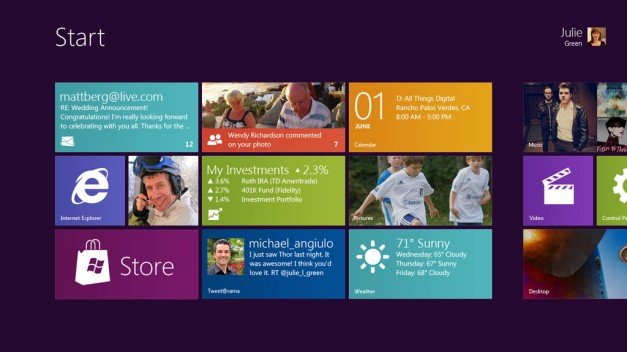Will Windows 8 be good for PC gaming?

Microsoft gave the world it's first glimpse of Windows 8 last night, with on stage presentations of the new look operating system at both the D9 conference in California and Computex in Taiwan. First impressions are that it's a big, bold and dramatic break from the past, with the biggest overhaul of the Windows desktop interface since it was introduced in 1995.
Designed for "touch first" screens and devices, the new UI closely resembles the one you'll find on Windows Phone 7 and Zune music players. There's no Start button, no window borders and no taskbar. Program launchers and live gadgets appear as a tiles in an irregular gridded layout, which can be manipulated using gestures to swipe across the screen, and the same gesture is used to move between running applications.
Here's the official video demonstrating Windows 8 and its new abilities.
The new look is clearly designed for tablets, and developers are being encouraged to use web friendly coding tools like HTML5 and JavaScript to write forthcoming apps. That means they will work regardless of whether you're running them on an ARM-based tablet or x86 desktop.
The big question this raises is what does it means the hardware-centric, DirectX-driven world of PC gaming?
First of all, don't panic that your existing games won't run on Windows 8. During the D9 presentation, vice president for Windows Experience, Julie Larson-Green, said that all existing Windows 7 compatible programs and peripherals will work on Windows 8. While the new look interface will likely be promoted as the best way to run Windows, there is a classic desktop mode which looks like Windows 7 for compatibility and familiarity purposes.
In other words, if you don't want the new look, you can turn it off. My impression is that it's similar to the way Windows Media Center works in Win 7, but more integral to future development of the OS.
The biggest gaming news, reviews and hardware deals
Keep up to date with the most important stories and the best deals, as picked by the PC Gamer team.
What that future holds is potentially very interesting indeed. Microsoft is making much of the fact that the system requirements for Windows 8 will be lower than Windows 7. At Computex, Windows 8 was demoed on an NVIDIA Tegra 3 tablet. Earlier in the week, NVIDIA showed tablets using this processor running 3D games using fairly advanced techniques like dynamic lighting.
So will the next generation of PC - sorry, Windows - games work as well on tablets as they do on the desktop? I asked Mark O'Connell, PR and Online Manager at Creative Assembly, what he thinks.
"It sounds like Microsoft is aiming to make Windows more cross-platform friendly," O'Connell said, "I think that a consistent interface across different devices could be a good thing, if implemented correctly for specific platforms (touch-screen versus traditional input methods, for example).
"As a developer, we're also interested to see what kinds of performance benefits it'll offer, and whether the OS will free up system resources. It's early days of course, but we're certainly keen to learn more about it."
Get it right, in other words, and you could be looking at one piece of game code for every device. Ponder that for a moment.
There are, however, lots of questions still to be answered. How ruthless will Microsoft really be in terms of culling the kernel to speed things up on low end devices? Is it really possible to achieve a 'one Windows' vision if you're looking at supporting both ARM and x86 platforms? Google is struggling to unify Android, for example, and it doesn't have all the legacy stuff to deal with.
The release date for Windows 8 hasn't been confirmed, other than to suggest some time in 2012, and we won't get many more details through official channels until Microsoft's BUILD conference in September (that's the new name for the Microsoft Developer Conference). It's a fair bet that some AAA developers are working on Windows 8 games already though, and hopefully they'll talk more about them at BUILD too.
If you don't like the look of the new Windows interface and think it's for tablets only, though, I'll leave you with this thought by one keen eyed commenter over at Engadget : notice that Windows 8 looks a lot like the Kinect interface for Xbox?
I don't think that touchscreens will be the be all and end all of BUILD.

